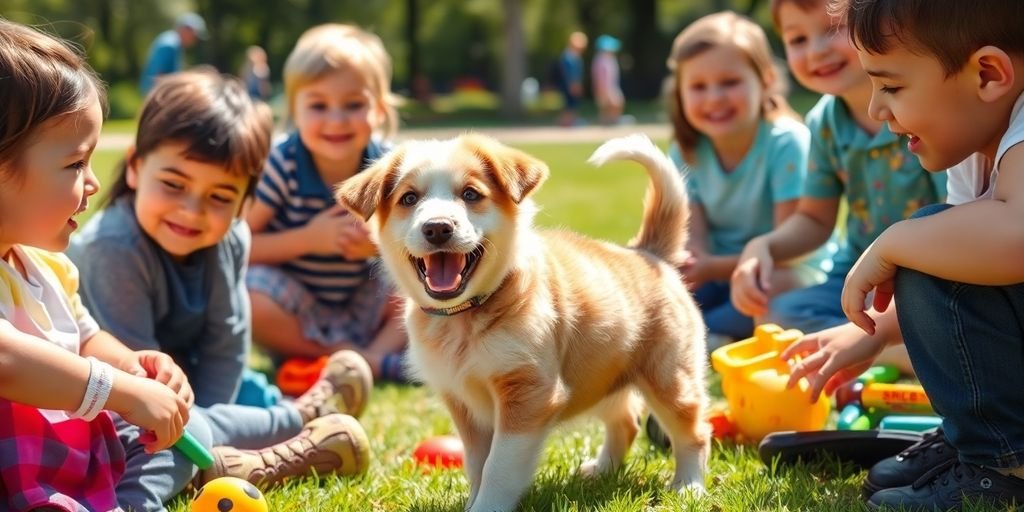
Raising a well-socialized puppy is key to ensuring they become friendly and confident dogs. Socialization helps your puppy learn how to interact with other dogs and people, making their experiences enjoyable and safe. In this guide, we’ll explore effective methods for socializing your puppy and the importance of empathy in the process.
Key Takeaways
- Start socializing your puppy early to build confidence and reduce fear.
- Use positive reinforcement to encourage good behavior during socialization.
- Expose your puppy to various environments, people, and other animals gradually.
- Continue socialization practices even after puppyhood to maintain good behavior.
- Empathy is crucial; understand your puppy’s feelings and comfort levels.
Understanding the Importance of Puppy Socialization
Why Social Skills Matter for Puppies
Social skills are essential for puppies as they help them interact positively with people and other dogs. Socialization plays a pivotal role in their development, influencing their behavior and temperament. Puppies that are well-socialized tend to be more relaxed and friendly, making them great companions.
Long-term Benefits of Early Socialization
Starting socialization early can lead to numerous long-term benefits:
- Improved behavior and social skills
- Increased confidence and adaptability
- Enhanced friendliness and reliability
- Faster learning and obedience during training
- Safety in unfamiliar situations
- A stronger bond with humans
Consequences of Poor Socialization
If puppies miss out on socialization, they may face several challenges:
- Increased fear and anxiety in new situations
- Difficulty interacting with other dogs and people
- Higher chances of developing aggressive behaviors
Early socialization is a gift that keeps on giving. It sets the stage for a lifetime of happiness and a strong relationship between you and your dog.
By understanding the importance of socialization, you can help your puppy grow into a well-adjusted adult dog that everyone loves!
Creating Positive Early Experiences

Introducing Your Puppy to New Environments
When you bring a puppy home, it’s crucial to introduce her to various environments. Start with familiar spaces like your home, then gradually expose her to new places. This helps her feel comfortable in different settings. Here are some tips:
- Use baby gates to control access to new areas.
- Allow her to explore at her own pace.
- Reward her with treats when she shows curiosity.
Handling and Grooming Tips
Getting your puppy used to being handled is essential for her comfort. Make grooming a fun experience by:
- Introducing her to brushes and combs slowly.
- Using treats to create positive associations.
- Keeping grooming sessions short and enjoyable.
Socializing with Other Animals
Meeting other animals is a key part of socialization. Ensure positive interactions by:
- Choosing small, calm playgroups.
- Monitoring all interactions to prevent negative experiences.
- Ending play sessions before your puppy gets too tired.
Remember, the goal is to create a positive experience for your puppy. The more she enjoys these early interactions, the better she will adapt as she grows.
| Experience Type | Positive Association | Tips |
|---|---|---|
| New Environments | Treats and praise | Gradual exposure |
| Grooming | Fun and treats | Short sessions |
| Other Animals | Calm introductions | Monitor play |
By focusing on these early experiences, you set the stage for a well-adjusted dog who is comfortable in various situations. Puppy training tips can help make crate training a positive experience for your puppy with these stress-free techniques.
Effective Techniques for Socializing Your Puppy
Using Positive Reinforcement
One of the best ways to help your puppy feel comfortable is through positive reinforcement. This means rewarding your puppy with treats, praise, or playtime when they encounter new experiences. For example, if your puppy meets a new person and stays calm, give them a treat! This helps your puppy learn that new situations can be fun and rewarding.
Gradual Exposure to New Situations
Start by introducing your puppy to new environments slowly. Take small steps to avoid overwhelming them. Here are some tips:
- Begin with quiet places before moving to busier areas.
- Allow your puppy to observe new sights and sounds from a distance.
- Gradually decrease the distance as your puppy becomes more comfortable.
Puppy Socialization Classes
Consider enrolling your puppy in a socialization class. These classes provide a safe space for your puppy to meet other dogs and people. Look for classes that focus on positive interactions and are led by experienced trainers. Remember, puppy classes are just the beginning; socialization should continue throughout your puppy’s life.
Socialization is a journey, not a race. Take your time and let your puppy guide you through their experiences.
By using these techniques, you can help your puppy grow into a well-adjusted and friendly dog. The key is to make every new experience a positive one!
Common Challenges and How to Overcome Them
Dealing with Fear and Anxiety
Many puppies can feel scared in new situations. Understanding your puppy’s feelings is key. Here are some tips to help:
- Introduce them slowly to new places.
- Use treats to create positive experiences.
- Always be patient and calm.
Managing Overexcitement
Puppies can get overly excited, which can lead to jumping or barking. To manage this:
- Teach them to sit before greeting people.
- Use toys to redirect their energy.
- Practice calmness with short training sessions.
Addressing Aggressive Behavior
If your puppy shows signs of aggression, it’s important to act quickly. Here’s how:
- Seek professional help if needed.
- Avoid situations that trigger aggression.
- Use positive reinforcement to reward good behavior.
Remember, socializing your puppy is a journey. Each step you take helps them become a well-adjusted dog.
By addressing these challenges early, you can help your puppy grow into a friendly and confident adult dog. Socialization is a continuous process, so keep working on it!
Maintaining Socialization Beyond Puppyhood
Continued Socialization Practices
To keep your dog well-adjusted, it’s important to continue socialization even after puppyhood. Here are some effective practices:
- Regular Outings: Take your dog to parks, pet-friendly stores, and community events.
- Playdates: Arrange playdates with other friendly dogs to maintain their social skills.
- Training Classes: Enroll in advanced training classes to reinforce good behavior and social skills.
Adapting to New Life Changes
Life changes can be stressful for dogs. Here’s how to help them adjust:
- Introduce Gradually: When moving or adding new family members, introduce changes slowly.
- Maintain Routine: Keep feeding and walking schedules consistent to provide stability.
- Positive Reinforcement: Reward your dog for calm behavior during transitions.
Building a Strong Human-Dog Bond
A strong bond with your dog is essential for their happiness. Here are some tips:
- Quality Time: Spend time playing, training, and cuddling with your dog.
- Communication: Use clear commands and body language to communicate effectively.
- Empathy: Understand your dog’s feelings and respond with patience and love.
Remember, socialization is a lifelong journey. Keeping your dog socialized helps them remain confident and happy throughout their life.

By following these practices, you can ensure that your dog remains a friendly and well-adjusted companion for years to come. Socialization secrets for smart dog breeds can make a big difference in their behavior and adaptability!
The Role of Empathy in Puppy Socialization
Understanding Your Puppy’s Perspective
When you bring a puppy into your home, it’s essential to remember that they are still babies in a big, new world. They have just left their mother and littermates, and everything is unfamiliar. Empathy is key in helping them adjust. By putting yourself in their paws, you can better understand their reactions and needs.
Building Trust Through Empathy
To create a strong bond with your puppy, you should:
- Be patient: Allow them time to explore their new environment.
- Use gentle touches: Puppies may not be used to being handled, so approach them softly.
- Listen to their cues: Pay attention to their body language and sounds to gauge their comfort level.
Balancing Training and Compassion
While training is important, it should be balanced with compassion. Here are some tips:
- Use positive reinforcement: Reward good behavior with treats or praise. Remember, using treats to reinforce behavior isn’t about buying love; it’s about creating a mutually beneficial relationship where both parties get something they want.
- Gradual exposure: Introduce new experiences slowly to avoid overwhelming your puppy.
- Encourage exploration: Let your puppy investigate their surroundings at their own pace.
Building a solid foundation of early experience is the greatest gift you can give your puppy. Once the socialization window closes, it will never open again, so take advantage of it!
Essential Tools and Resources for Puppy Socialization
Socializing your puppy is crucial for their development. Here are some essential tools and resources to help you on this journey:
Choosing the Right Training Equipment
- Leashes and Collars: Opt for a comfortable collar and a sturdy leash. A harness can also be beneficial for training.
- Treats: Use small, tasty treats to reward your puppy during training sessions.
- Toys: Interactive toys can help keep your puppy engaged and encourage play with other dogs.
Finding a Good Dog Trainer
- Look for trainers who specialize in puppy socialization.
- Check reviews and ask for recommendations from other dog owners.
- Ensure the trainer uses positive reinforcement techniques.
Utilizing Online Resources and Communities
- Join online forums or social media groups focused on puppy training.
- Watch instructional videos to learn new techniques.
- Read articles and blogs for tips on socialization.
Remember, socialization is a continuous process. The more positive experiences your puppy has, the better adjusted they will be in the long run.
By using these tools and resources, you can create a well-rounded socialization plan for your puppy. Discover valuable dog training resources to enhance your skills and strengthen your bond with your canine companion!
Final Thoughts on Raising a Socialized Puppy
In conclusion, raising a well-socialized puppy is one of the best gifts you can give your furry friend. By introducing them to new experiences, people, and other dogs, you help them grow into a happy and confident adult. Remember, patience and understanding are key. Every puppy learns at their own pace, so celebrate their small victories along the way. With love and guidance, your puppy can become a beloved companion who brings joy to everyone they meet!

Frequently Asked Questions
What is puppy socialization and why is it important?
Puppy socialization is the process of introducing your puppy to different people, places, and experiences. It’s important because it helps your puppy grow into a well-adjusted adult dog who is comfortable in various situations.
When should I start socializing my puppy?
You should start socializing your puppy as soon as you bring them home, ideally before they are 16 weeks old. This is a crucial time for them to learn about the world.
How can I socialize my puppy at home?
You can socialize your puppy at home by exposing them to different sounds, sights, and smells. Invite friends over, play different types of music, and introduce them to household items.
What if my puppy is scared of new experiences?
If your puppy seems scared, go slowly and let them explore at their own pace. Use treats and positive reinforcement to encourage them.
Are puppy classes necessary for socialization?
While puppy classes are helpful, they are not the only way to socialize your puppy. You can also socialize them through everyday experiences and interactions.
How can I tell if my puppy is well-socialized?
A well-socialized puppy will be confident, friendly, and comfortable around people and other dogs. They should also respond well to training and be able to handle new situations without fear.

